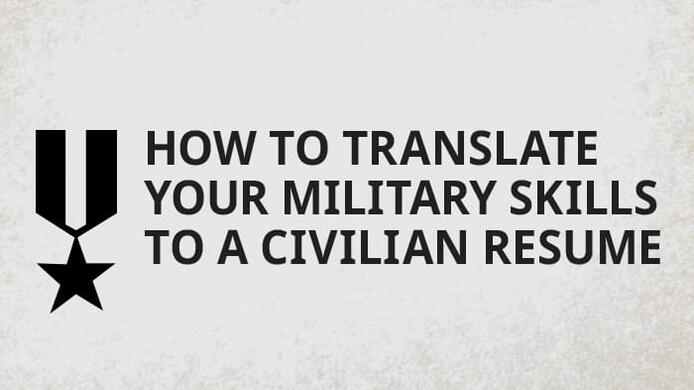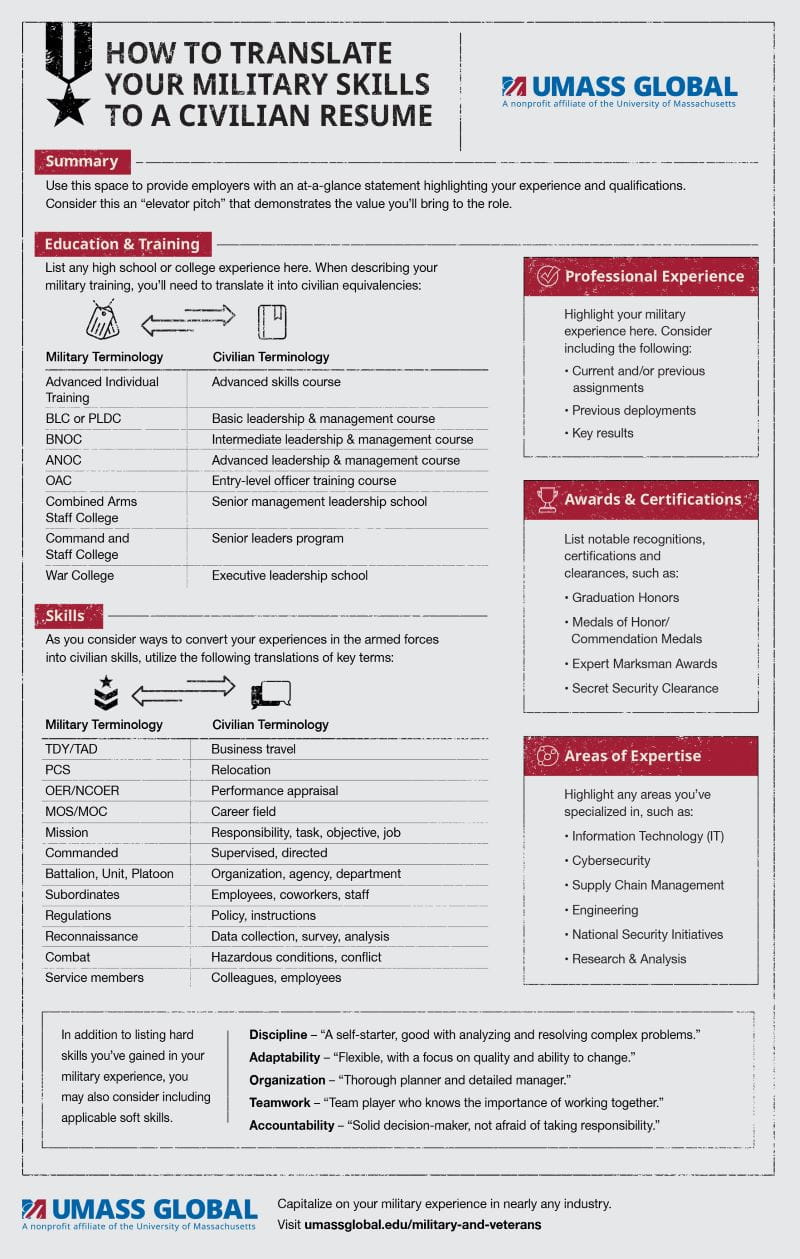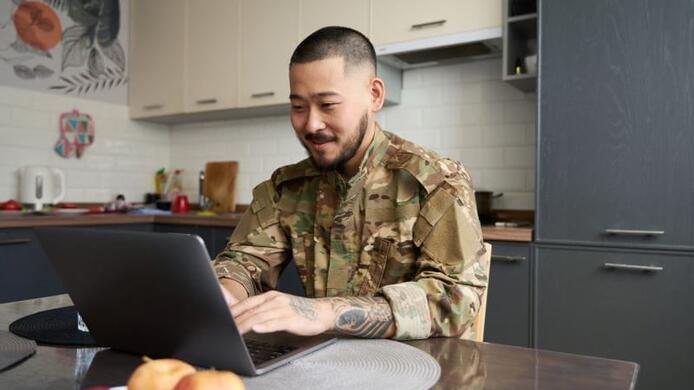UMass Global offers a wide variety of degree programs for active military and veterans. Explore your options and find a degree that fits you.

When an active-duty member of the military is preparing to transition to the civilian world, it can seem like a daunting proposition. How will your military training and experience translate to the skill set that employers are looking for? After all, most job postings don't mention things such as being deployed on an aircraft carrier in the Indian Ocean, running patrols in Anbar Province, or being a munitions systems specialist at Ramstein Air Base in Germany.
But if you're transitioning from the military to the civilian workforce, know this — your skills are exactly what employers are looking for. That could explain why the Bureau of Labor Statistics reported the unemployment rate for veterans in 2024 was nearly one full percentage point lower than for nonveterans (3.0 percent versus 3.9 percent).
In this article, let's detail the reasons why employers look to hire veterans. Plus, at the end, we're including a resume information to help you tell the world about what you have to offer.
5 Compelling Reasons Why Employers Are Eager to Hire Military Veterans
The great news for active and reserve service members and veterans is that your time spent in the armed forces has prepared you for success in the civilian workforce in several different ways. Now, the biggest hurdle you'll face is learning how to talk about it.
"Depending on your role in the military, your transferable skills could actually land you successfully in just about any industry," says Katy Curameng, former director of career planning and development at UMass Global.
Curameng points to the fact that service members are highly trained individuals who are accustomed to working in teams and have unmatched work ethic. "These are skills that are difficult, if not impossible, to teach," she says, highlighting the true value of military veterans' repertoire to potential employers.
Here are a few specific areas where veterans excel when compared with civilian job seekers.
1. Veterans Know the Value of Teamwork
Stewart J. Guss is founder of his own national law firm, Trust Guss, which employs more than 100 professionals. Guss says that recruiting and hiring veterans has long been a no-brainer at his firm, and one important asset is teamwork.
"Teamwork is critical to ensure the best possible results for our clients. No one understands the importance of teamwork better than a veteran," he explains.
Teamwork is ingrained in members of the military from the moment they enter the service. On the battlefield teamwork can mean the difference between life and death. The team always needs to come before the individuals.
2. Veterans Can Quickly Adapt
If there is one constant about the modern workplace, it's change. Whether it be technology, a volatile economy, or changing marketplace conditions — the one sure thing is that there isn't any sure thing. In that light, employers need employees who are adaptable and not afraid of change.
"The military teaches you to think and act flexibly so that if your battle plan isn't working, you pivot immediately to a plan that does," explains Paul Dillon, President and CEO of Dillon Consulting Services and an expert in veteran employment who commonly speaks at conferences and symposiums.
3. Veterans Are Goal Oriented and Results Focused
Achieving objectives is standard military strategy; that mindset meshes perfectly into the business world. Military members are trained to follow through until a mission is accomplished, paying attention to, but not getting sidetracked by, the details along the way.
This goal-oriented, results-focused approach is highly valued in civilian careers. Laura Handrick, senior HR specialist and consultant, notes that the self-sufficiency and the respect for procedure veterans learn in their training will serve them well for the rest of their lives.
"The thing I like most about veterans is their sense of discipline and attention to detail," she explains. "With years working in an environment that rewards adherence to standards and peak performance, veterans are naturally suited to jobs with measurable results."
4. Veterans Have Exceptional Leadership Skills
Because of the hierarchical nature of the military, veterans understand leadership dynamics. Plus, they tend to learn those skills at a younger age than typical civilian workers.
"A college grad may find themselves in a management role [a few] years into their career," Handrick points out. "A veteran may have been thrust into management roles more quickly and likely received significant training on how to lead." Those leadership skills, she notes, are what make veterans excellent at motivating and working with teams.
"The best leadership training in the world is the training that is given to commissioned officers and senior non-commissioned officers in the Armed Forces of the United States," Dillon adds. "As young Army officers, we were taught to take care of our troops first if you want them to follow you."
Management/leadership skills are valued in every organization in the civilian world. The training and experience of veterans proves invaluable in the transition into civilian careers.
5. Veterans Are Diverse, Just Like the Workforce
The newest generation in the workforce — Generation Z — is the most diverse in U.S. history, with only about 51 percent of this group being non-Hispanic white. The next generation, Generation Alpha, will be the first non-white majority generation. To be successful, organizations need to mirror this diversity throughout their workforce.
And who do you think is perfectly suited to a diverse workplace? Veterans.
"If you're going to be successful in the military, you need to work with all kinds of people, from all races, creeds, genders, backgrounds, and persuasions," Dillon explains.
Serving in the military helps veterans understand the inclusion aspect of teamwork perfectly, Dillon adds. To accomplish the end goal, service members have learned to trust and rely on one another, regardless of their backgrounds.
Military Members, You Are in Demand
As you can see, active-duty and reserve military members and veterans have skills that are highly valued in the civilian world. Let's let the former CEO of AT&T, Randall L. Stephenson, sum things up.
He says, "We hire military veterans because they make great employees. They bring proven technical and leadership skills. They understand teamwork, and they're adaptable. Bottom line, hiring veterans is good for business."
You've heard from various experts from the civilian working world, and they agree on this — the skills you've learned and gained through experience in the military have incredible value in the civilian workforce. All you need to do is get the word out there. And we've created an infographic to conclude this article to help you do just that.
Translating Your Military Skills to the Civilian World
How to Translate Your Military Skills to a Civilian Resume provides you with a framework for your resume, along with some suggestions on how to phrase your military terminology in a civilian fashion. We've created it to take some of the mystery out of creating your resume for your new career in the civilian world.
Here is the gist of it, but to see the infographic scroll down to the bottom of this article. The variations from a military resume to a civilian resume are mainly terminology, especially due to the many acronyms used in the military that may not be understood by a civilian in a hiring role.
For your "Education & Training" section, these are the terms and how they would translate:
- Advanced Individual Training = Advanced skills course
- BLC or PLDC = Basic leadership and management course
- BNOC = Intermediate leadership and management course
- ANOC = Advanced leadership and management course
- OAC = Entry-level officer training course
- Combined Arms Staff College = Senior management leadership school
- Command Staff College = Senior leaders program
- War College = Executive leadership school
For your "Skills" section, these are the terms and how they would translate:
- TDY/TAD = Business travel
- PCS = Relocation
- OER/NCOER = Performance appraisal
- MOS/MOC = Career field
- Mission = Responsibility, task, objective, job
- Commanded = Supervised, directed
- Battalion, Unit, Platoon = Organization, agency, department
- Subordinates = Employees, coworkers, staff
- Regulations = Policy, instructions
- Reconnaissance = Data collection, survey, analysis
- Combat = Hazardous conditions, conflict
- Service member = Colleagues, employees
In your "Professional Experiences" section, you will highlight your military experience:
- Current and/or previous assignments
- Previous deployments
- Key results
In your "Awards & Certifications" section, list notable recognitions, certifications, and clearances, such as:
- Graduation Honors
- Medals of Honor/Commendation Medals
- Expert Marksman Awards
- Secret Security Clearance
In your "Areas of Expertise" section, highlight any areas you've specialized in, such as:
- Information technology
- Cybersecurity
- Supply Chain Management
- Engineering
- National Security Initiatives
- Research & Analysis
At UMass Global, about 11 percent of our students are either active duty or reservists, veterans, or their dependents. The university's origins trace back to 1958, offering outreach education to Marines stationed at El Toro Marine Corps Air Station in Organge County, California. Our commitment to our military students is one of our foundations and ongoing mission.
We hope this article fueled your confidence as you move to a career in the civilian world. For more resources, be sure to check out UMass Global Career Services for military students and browse our various academic programs available.






